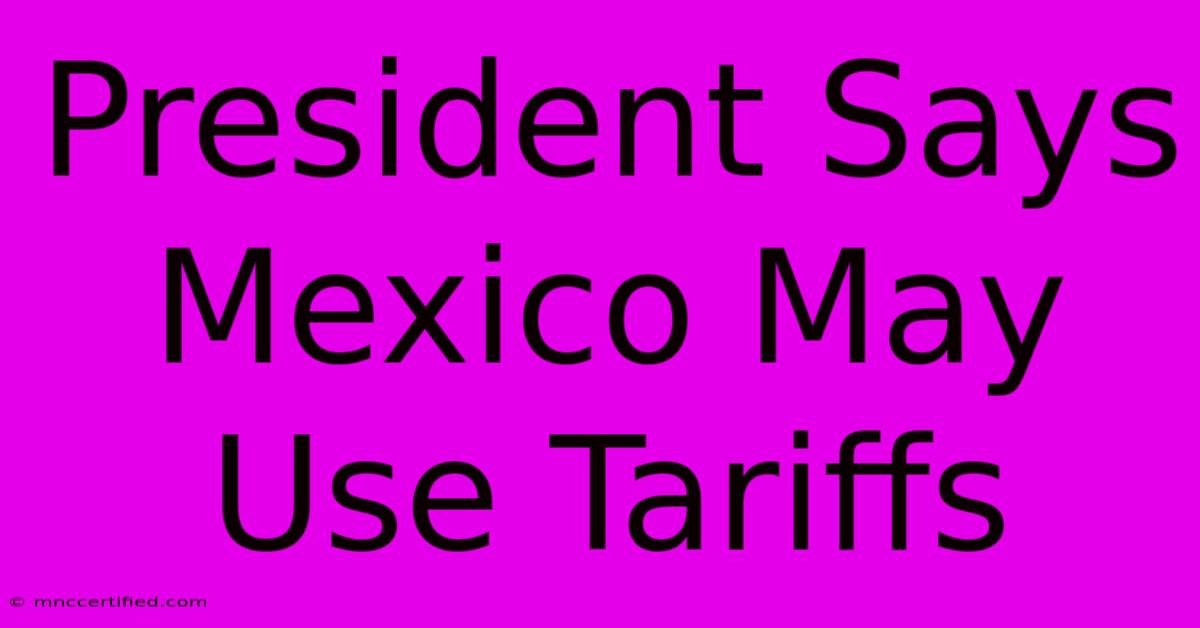President Says Mexico May Use Tariffs

Table of Contents
President Says Mexico May Use Tariffs: A Deep Dive into Potential Economic Fallout
Mexico's potential use of tariffs is a significant development with far-reaching implications for the global economy. Recent statements by the Mexican President regarding retaliatory tariffs have sparked considerable debate and uncertainty. This article delves into the intricacies of this situation, examining the potential triggers, likely targets, and broader economic consequences.
Understanding the President's Statement: Context and Implications
The Mexican President's statement about potentially implementing tariffs wasn't made in a vacuum. It's crucial to understand the underlying context. This likely stems from [insert specific event or policy here, e.g., ongoing trade disputes with the US, internal economic pressures, or a specific industry facing challenges]. The statement itself should be analyzed carefully, considering the specific wording used and any qualifiers mentioned. Did the President definitively commit to tariffs, or was it a conditional threat? This nuance is critical to understanding the situation's gravity.
Potential Triggers for Mexican Tariffs
Several factors could precipitate Mexico's implementation of tariffs. These could include:
- Trade Disputes: Unresolved trade conflicts with major partners, particularly the United States, could easily lead to retaliatory tariffs as a defensive measure.
- Protectionism: A desire to protect domestic industries from foreign competition could drive the decision, especially if certain sectors are struggling.
- Political Pressure: Internal political pressures from lobbying groups or specific industries could influence the government to pursue protectionist policies.
- Economic Sanctions: As a response to economic sanctions imposed by other countries, Mexico might employ tariffs as a countermeasure.
Target Industries and Potential Impacts
Identifying the potential target industries for Mexican tariffs is crucial for assessing the economic ramifications. Sectors likely to be affected include:
- Agricultural Products: If targeting the US, agricultural products like corn and soybeans could face higher import duties.
- Manufactured Goods: A wide range of manufactured goods, from automobiles to electronics, could be subject to tariffs depending on the specific trade disputes.
- Energy Sector: The energy sector, particularly if disputes arise over energy independence, could see significant tariff implications.
The impacts will likely be multifaceted:
- Increased Prices for Consumers: Tariffs directly increase the price of imported goods, leading to higher consumer costs.
- Reduced Trade Volume: Higher tariffs discourage imports, leading to a reduction in trade volume between Mexico and its trading partners.
- Retaliatory Measures: The imposition of Mexican tariffs could trigger retaliatory measures from other countries, escalating the trade conflict and harming global trade.
Analyzing the Economic Fallout: A Global Perspective
The economic consequences of Mexico using tariffs extend beyond its borders. The global interconnectedness of economies means that any significant trade disruption in Mexico will have ripple effects worldwide.
Impact on North American Trade
Given Mexico's significant trade relationship with the US and Canada, any tariff imposition will heavily impact the North American trade landscape. The existing trade agreements, such as USMCA (United States-Mexico-Canada Agreement), could be significantly impacted and renegotiated.
Global Supply Chains and Inflation
Disruptions to supply chains, caused by increased trade costs and reduced trade volumes, could further fuel global inflation and contribute to economic instability.
Conclusion: Navigating Uncertainty
The Mexican President's statement on potential tariff implementation introduces significant uncertainty into the global economic landscape. Careful monitoring of the situation, including official pronouncements and any policy shifts, is crucial for businesses and investors. The potential for escalation and the far-reaching consequences underscore the need for proactive diplomacy and collaborative solutions to mitigate the risks associated with trade conflicts. This complex situation requires ongoing analysis and a nuanced understanding of the political and economic forces at play. The international community must work together to navigate this challenging terrain and minimize the negative impacts on global trade and economic stability.

Thank you for visiting our website wich cover about President Says Mexico May Use Tariffs. We hope the information provided has been useful to you. Feel free to contact us if you have any questions or need further assistance. See you next time and dont miss to bookmark.
Featured Posts
-
Texas Farm And Ranch Insurance
Nov 27, 2024
-
Dhl Crash In Lithuania Authorities Seek Answers
Nov 27, 2024
-
Insurance Claim Letter Example
Nov 27, 2024
-
Controversial Guest Causes Ofcom Backlash On This Morning
Nov 27, 2024
-
Can I Sue My Insurance Company
Nov 27, 2024